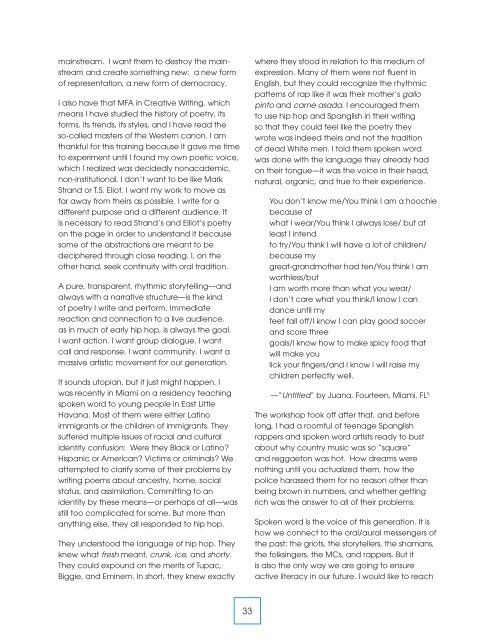The New Face of Arts Leadership in the West - westaf - The Western ...
The New Face of Arts Leadership in the West - westaf - The Western ...
The New Face of Arts Leadership in the West - westaf - The Western ...
Create successful ePaper yourself
Turn your PDF publications into a flip-book with our unique Google optimized e-Paper software.
ma<strong>in</strong>stream. I want <strong>the</strong>m to destroy <strong>the</strong> ma<strong>in</strong>stream<br />
and create someth<strong>in</strong>g new: a new form<br />
<strong>of</strong> representation, a new form <strong>of</strong> democracy.<br />
I also have that MFA <strong>in</strong> Creative Writ<strong>in</strong>g, which<br />
means I have studied <strong>the</strong> history <strong>of</strong> poetry, its<br />
forms, its trends, its styles, and I have read <strong>the</strong><br />
so-called masters <strong>of</strong> <strong>the</strong> <strong>West</strong>ern canon. I am<br />
thankful for this tra<strong>in</strong><strong>in</strong>g because it gave me time<br />
to experiment until I found my own poetic voice,<br />
which I realized was decidedly nonacademic,<br />
non-<strong>in</strong>stitutional. I don’t want to be like Mark<br />
Strand or T.S. Eliot. I want my work to move as<br />
far away from <strong>the</strong>irs as possible. I write for a<br />
different purpose and a different audience. It<br />
is necessary to read Strand’s and Elliot’s poetry<br />
on <strong>the</strong> page <strong>in</strong> order to understand it because<br />
some <strong>of</strong> <strong>the</strong> abstractions are meant to be<br />
deciphered through close read<strong>in</strong>g. I, on <strong>the</strong><br />
o<strong>the</strong>r hand, seek cont<strong>in</strong>uity with oral tradition.<br />
A pure, transparent, rhythmic storytell<strong>in</strong>g—and<br />
always with a narrative structure—is <strong>the</strong> k<strong>in</strong>d<br />
<strong>of</strong> poetry I write and perform. Immediate<br />
reaction and connection to a live audience,<br />
as <strong>in</strong> much <strong>of</strong> early hip hop, is always <strong>the</strong> goal.<br />
I want action. I want group dialogue. I want<br />
call and response. I want community. I want a<br />
massive artistic movement for our generation.<br />
It sounds utopian, but it just might happen. I<br />
was recently <strong>in</strong> Miami on a residency teach<strong>in</strong>g<br />
spoken word to young people <strong>in</strong> East Little<br />
Havana. Most <strong>of</strong> <strong>the</strong>m were ei<strong>the</strong>r Lat<strong>in</strong>o<br />
immigrants or <strong>the</strong> children <strong>of</strong> immigrants. <strong>The</strong>y<br />
suffered multiple issues <strong>of</strong> racial and cultural<br />
identity confusion: Were <strong>the</strong>y Black or Lat<strong>in</strong>o?<br />
Hispanic or American? Victims or crim<strong>in</strong>als? We<br />
attempted to clarify some <strong>of</strong> <strong>the</strong>ir problems by<br />
writ<strong>in</strong>g poems about ancestry, home, social<br />
status, and assimilation. Committ<strong>in</strong>g to an<br />
identity by <strong>the</strong>se means—or perhaps at all—was<br />
still too complicated for some. But more than<br />
anyth<strong>in</strong>g else, <strong>the</strong>y all responded to hip hop.<br />
<strong>The</strong>y understood <strong>the</strong> language <strong>of</strong> hip hop. <strong>The</strong>y<br />
knew what fresh meant, crunk, ice, and shorty.<br />
<strong>The</strong>y could expound on <strong>the</strong> merits <strong>of</strong> Tupac,<br />
Biggie, and Em<strong>in</strong>em. In short, <strong>the</strong>y knew exactly<br />
where <strong>the</strong>y stood <strong>in</strong> relation to this medium <strong>of</strong><br />
expression. Many <strong>of</strong> <strong>the</strong>m were not fluent <strong>in</strong><br />
English, but <strong>the</strong>y could recognize <strong>the</strong> rhythmic<br />
patterns <strong>of</strong> rap like it was <strong>the</strong>ir mo<strong>the</strong>r’s gallo<br />
p<strong>in</strong>to and carne asada. I encouraged <strong>the</strong>m<br />
to use hip hop and Spanglish <strong>in</strong> <strong>the</strong>ir writ<strong>in</strong>g<br />
so that <strong>the</strong>y could feel like <strong>the</strong> poetry <strong>the</strong>y<br />
wrote was <strong>in</strong>deed <strong>the</strong>irs and not <strong>the</strong> tradition<br />
<strong>of</strong> dead White men. I told <strong>the</strong>m spoken word<br />
was done with <strong>the</strong> language <strong>the</strong>y already had<br />
on <strong>the</strong>ir tongue—it was <strong>the</strong> voice <strong>in</strong> <strong>the</strong>ir head,<br />
natural, organic, and true to <strong>the</strong>ir experience.<br />
You don’t know me/You th<strong>in</strong>k I am a hoochie<br />
because <strong>of</strong><br />
what I wear/You th<strong>in</strong>k I always lose/ but at<br />
least I <strong>in</strong>tend<br />
to try/You th<strong>in</strong>k I will have a lot <strong>of</strong> children/<br />
because my<br />
great-grandmo<strong>the</strong>r had ten/You th<strong>in</strong>k I am<br />
worthless/but<br />
I am worth more than what you wear/<br />
I don’t care what you th<strong>in</strong>k/I know I can<br />
dance until my<br />
feet fall <strong>of</strong>f/I know I can play good soccer<br />
and score three<br />
goals/I know how to make spicy food that<br />
will make you<br />
lick your f<strong>in</strong>gers/and I know I will raise my<br />
children perfectly well.<br />
—“Untitled” by Juana, Fourteen, Miami, FL 5<br />
<strong>The</strong> workshop took <strong>of</strong>f after that, and before<br />
long, I had a roomful <strong>of</strong> teenage Spanglish<br />
rappers and spoken word artists ready to bust<br />
about why country music was so “square”<br />
and reggaeton was hot. How dreams were<br />
noth<strong>in</strong>g until you actualized <strong>the</strong>m, how <strong>the</strong><br />
police harassed <strong>the</strong>m for no reason o<strong>the</strong>r than<br />
be<strong>in</strong>g brown <strong>in</strong> numbers, and whe<strong>the</strong>r gett<strong>in</strong>g<br />
rich was <strong>the</strong> answer to all <strong>of</strong> <strong>the</strong>ir problems.<br />
Spoken word is <strong>the</strong> voice <strong>of</strong> this generation. It is<br />
how we connect to <strong>the</strong> oral/aural messengers <strong>of</strong><br />
<strong>the</strong> past: <strong>the</strong> griots, <strong>the</strong> storytellers, <strong>the</strong> shamans,<br />
<strong>the</strong> folks<strong>in</strong>gers, <strong>the</strong> MCs, and rappers. But it<br />
is also <strong>the</strong> only way we are go<strong>in</strong>g to ensure<br />
active literacy <strong>in</strong> our future. I would like to reach<br />
33


